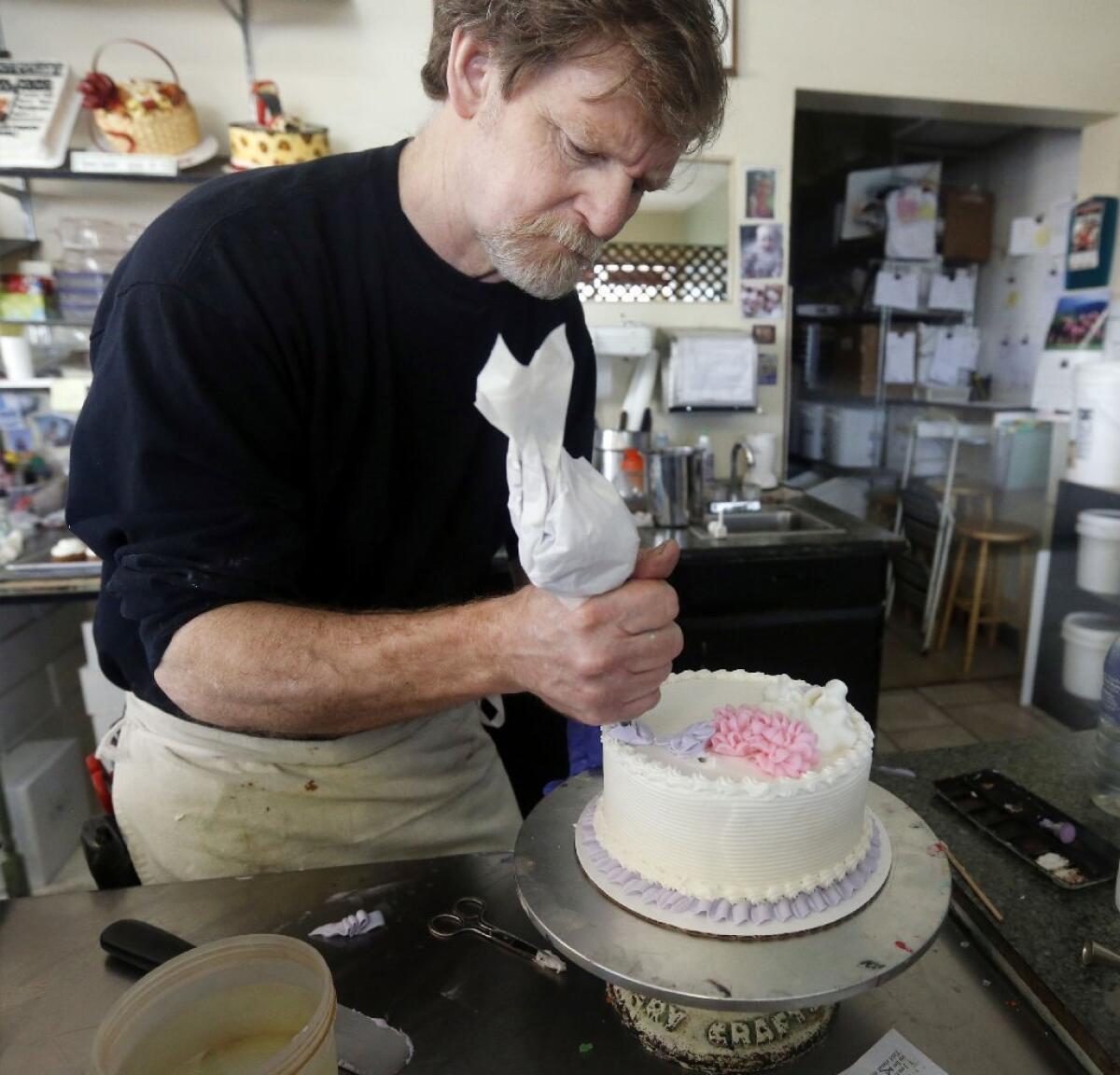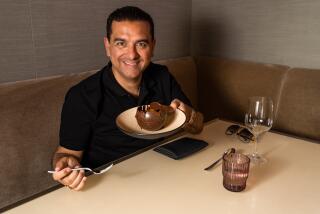Opinion: The sleeper issue in the ‘gay wedding cake’ controversy

Baker Jack C. Phillips refused to create a wedding cake for a gay couple, saying he did not want to convey a “celebratory” message he doesn’t believe in. He said he was happy to provide the couple with other baked goods, though.
- Share via
Social conservatives have rallied behind bakers and photographers who don’t want to provide services for same-sex weddings. But the courts continue to be unsympathetic. The latest rebuff was a decision last week by the Colorado Court of Appeals in the case of Jack C. Phillips, a Christian baker who refused to create a wedding cake for a gay couple who planned to marry in Massachusetts but celebrate their union in Colorado.
The court’s opinion rejects arguments that forcing Phillips to supply a cake to Charlie Craig and David Mullins violated Phillips’ freedom of religion or his 1st Amendment right against being compelled to convey a “celebratory” message he doesn’t believe in.
But to reach those questions, the court had to reject another legal claim by Phillips that hasn’t received enough attention: that in refusing to provide the cake, he wasn’t engaging in anti-gay discrimination. Phillips noted that he was happy to provide Craig and Mullins with other baked goods. (Less persuasively, he floated the idea that heterosexual couples might also enter into a same-sex marriage.)
The appeals court was quick -- maybe too quick -- to accept the idea that refusal to bake a cake for a same-sex wedding is tantamount to discriminating against customers on the basis of their sexual orientation. The court ruled that “the act of same-sex marriage is closely correlated to Craig’s and Mullins’ sexual orientation.” Therefore, an administrative law judge hadn’t erred in concluding that Phillips’ refusal to bake the cake was “because of” the couple’s sexual orientation.
The appeals court backed that conclusion with a citation from a 2010 U.S. Supreme Court decision. That case concerned a Christian group at the UC Hastings College of Law that required its leaders to affirm, and live by, the traditional view that sex is permissible only within heterosexual marriage.
The law school had refused to recognize the Christian Legal Society chapter because, it said, the group was in violation of a policy that membership and leadership positions in such groups must be open to “all comers.” Student groups, couldn’t discriminate on the basis of “race, color, religion, national origin, ancestry, disability, age, sex or sexual orientation.”
The Christian group argued that it excluded some students not because of their sexual orientation, but rather “on the basis of a conjunction of conduct and the belief that the conduct is not wrong.” In other words, celibate gays who endorsed the group’s Christian moral theology were welcome despite their sexual orientation.
Writing for the court, Justice Ruth Bader Ginsburg rejected that argument, noting that in gay rights cases, the court had “declined to distinguish between status and conduct.”
To a lot of gay rights supporters, it’s self-evident that a refusal to bake a cake for a same-sex wedding is discrimination on the basis of sexual orientation. But there are people, such as Phillips and the bishops of the Roman Catholic Church, who insist on a distinction between sexual orientation and sexual activity or participation in a same-sex marriage.
And here’s another question raised by David French in the National Review: If discrimination on the basis of sexual orientation is interpreted in broad terms, would a similarly broad definition of racial discrimination require a baker to provide a Confederate-flag cake for a white supremacist group lest he be accused of bias against whites? (Phillips said he also objected to baking cakes that incorporate racist symbols.)
The decision in the Christian Legal Society case was 5 to 4. (One justice in the majority, John Paul Stevens, has since retired, but his successor, Elena Kagan, likely would rule the same way.) So it seems that bakers, wedding photographers and other merchants who live in jurisdictions that prohibit discrimination on the basis of sexual orientation won’t be able to argue that “we’re not anti-gay, we’re just anti-gay-marriage.”
That leaves arguments based on freedom of religion or freedom of speech, but those don’t seem very promising either. A New Mexico wedding photographer who refused to take pictures of a same-sex celebration appealed a decision against her to the U.S. Supreme Court; last year the justices refused even to hear the case.
Twitter: @MichaelMcGough3
More to Read
A cure for the common opinion
Get thought-provoking perspectives with our weekly newsletter.
You may occasionally receive promotional content from the Los Angeles Times.










